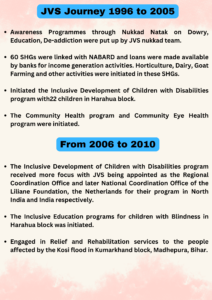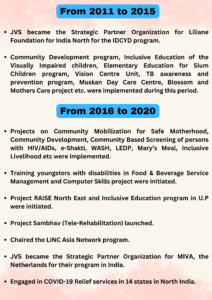Vision
We visualize an inclusive humane society based on the values of equity, justice and freedom.
Mission
Empowerment of the marginalized, including women, children and persons with disabilities, through a process of sensitizing and organizing them for socio‐economic upliftment.
Impelled by social problems, like poverty, discrimination and unjust practices in the society, Immanuel George (Abhishiktananad) together with like-minded friends formed ‘Jan Vikas Samiti’ based on justice, equity and freedom.
Since inception, the organization has been working for the integral development of the marginalized and underprivileged sections of society, particularly of women, children, scheduled caste and persons with disabilities.
Amongst our interventions, we directly implement programs on Community Health and WASH, Livelihoods Promotion for Women, Rehabilitation of Children and Youngsters with Disabilities, Women Empowerment and Skill Training for Youth.
Over the years, Jan Vikas Samiti (JVS) has been engaged in creating an inclusive environment for social and economic development of disadvantaged people by enabling them to have access to education, employment and equal rights.
History
As a panacea to the age old problems of superstition, discrimination, exploitation and lack of education among other issues which were dehumanizing and creating barriers in the society on the one hand and the day-to-day struggles of the poor and the marginalized communities like the dalits, musahars, women etc. for survival and dignity both in family and society, our pioneers envisioned a society based on justice, equity and fullness of life for all. Deeply convinced of the need for a humane society, the founding members of the Society, who had already dedicated their full life for the cause of the poor and the marginalized sections of the society, decided to address the causes of these social issues by going to the people. They made a choice for the marginalized and underprivileged sections of the society, particularly the women and scheduled caste. They knew that the root cause of many issues was lack of awareness and education. They believed that education could be the key to overcoming poverty and all social evil at all levels. Thus, the founding members held meetings in the villages of Harahua and made the people aware of the need for education and give up the superstitious practices. Slowly and gradually people participated in meetings and the change began to happen.
The Society initiated adult education and community health programmes in selected 20 villages of Harahua, Varanasi. The marginalized people, especially the dalits and women were the focus groups, who gradually participated in our meetings. In the cause of time, the seeds of social transformation began to yield results in different ways. Over the years, JVS has been engaged in creating an inclusive society and socio-economic development of the disadvantaged communities by enabling them to have access to education, employment and equal rights.
Initially, people in the villagers doubted our intentions and did not cooperate. Women did not attend the meetings. But, the constant efforts and visits by our women animators won the confidence of the villagers including men, who occasionally in small numbers attended the meetings and listened to our story. More villagers invited us and we spread our story among them. In 2001, 60 SHGs were linked with banks for credit linkage and today JVS facilitates 832 SHGs. In 2003, 22 children with disabilities were identified for rehabilitation and the number has reached over 6000 today. In 2008 & 2020-21 JVS engaged in rehabilitation work during the Kosi floods in Ranipatti and COVID-19 respectively. In 2012 JVS became the Strategic Partner Organization for Liliane Foundation for North India for the project on Inclusive Development of Children and Youngsters with Disabilities. The Tele-rehabilitation project started in 2018 has proved to be innovative and replicable.
A continuous process of animation and advocacy among men and women to become aware, form and organize into groups and to take actions for integrated participatory sustainable development is our strategy and approach. To achieve this, the Organization since its inception, has focused on building the ‘social capital’ and thereby the active participation of people in development actions. In all the development processes and actions the focus groups play vital role, including project planning, implementation, monitoring and evaluation. The process of empowering continues with different age groups or need groups forming their own collectives for solidarity and action. A strong sense of ownership and responsibility is advocated among the stakeholders. The Inclusive Children’s Parliaments take up responsibility not only for their peers’ needs but also all other issues that affect their families and society at large. The Adolescent Girls Groups are a great support group for their peers especially for their growing age related concerns. The Expectant and Young Mothers Group are a platform for learning related to child bearing and caring. Our empowered groups and leadership at different level lead the way to social change. The organization provide back end support and facilitates programmes to achieve our vision for a humane society.
Livelihood opportunities and initiatives for women – Rural women mostly are engaged in their field and to a large extend are dependent on their families for their needs and survival. The organization has initiated livelihood and skill development programmes for women including entrepreneur skills to enable them less dependent on others.
Harassment and Domestic Violence against Women – Under the influence of alcohol a lot of male members ill-treat and harass their female members in their homes. We encourage the female members of our SHGs to share such incidents in their group meetings. When such cases are reported, the SHG and Cluster Level Committees take up the issues and try to solve them. They have also taken up the issue of illegal liquor production and has stopped a number of them with support from administration.
Large Number of Children with Disabilities in Rural Areas – In rural areas and among certain communities, prevalence of disability is higher. Through our Tele-rehabilitation programme we are trying to address this issue by reaching the unreached. We are focusing on early detection and early intervention in such remotest areas. For the successful intervention and rehabilitation of children with disabilities we are capacitating the CBR workers through regular and intensive trainings programmes.




